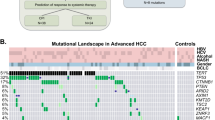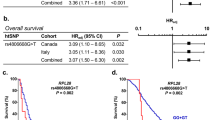Abstract
In patients with colorectal liver metastases (CLM), liver resection offers the possibility of cure and long-term survival. The liver is a highly immunogenic organ harboring ~80% of the body’s tissue macrophages. Emerging data demonstrate a critical role of the immune response for cancer treatment. We investigated variations within genes involved in immune response checkpoints and their association with outcomes in patients with CLM who underwent neoadjuvant chemotherapy including bevacizumab and liver resection. Single-nucleotide polymorphisms (SNPs) in nine genes (CCL2, CCR2, LAG3, NT5E, PDCD1, CD274, IDO1, CTLA4 and CD24) were analyzed in genomic DNA from 149 patients with resected bevacizumab-pretreated CLM by direct Sanger DNA sequencing, and correlated with response, recurrence-free survival (RFS), overall survival (OS), probability of cure and recurrence patterns. IDO1 (indoleamine 2, 3-dioxygenase) rs3739319 G>A and CD24 rs8734 G>A showed a significant difference in 3-year OS rates. In addition, IDO1 rs3739319 G>A was significantly associated with extrahepatic recurrence. Recursive partitioning analyses revealed that IDO1 rs3739319 G>A was the dominant SNP predicting RFS and OS. Our data suggest that variants within genes involved in immune response checkpoints are associated with outcomes in patients with resected CLM and might lead to improved treatment strategies modulating anti-tumor immune response by targeting novel immune checkpoints.
This is a preview of subscription content, access via your institution
Access options
Subscribe to this journal
Receive 6 print issues and online access
$259.00 per year
only $43.17 per issue
Buy this article
- Purchase on Springer Link
- Instant access to full article PDF
Prices may be subject to local taxes which are calculated during checkout





Similar content being viewed by others
References
Howlader N, Noone AM, Krapcho M, Garshell J, Neyman N, Altekruse SF et al (based on November 2012 SEER data submission, posted to the SEER web site, April 2013). SEER Cancer Statistics Review, 1975-2010. National Cancer Institute: Bethesda, MD, USA.
Andre T, Boni C, Mounedji-Boudiaf L, Navarro M, Tabernero J, Hickish T et al. Oxaliplatin, fluorouracil, and leucovorin as adjuvant treatment for colon cancer. N Engl J Med 2004; 350: 2343–2351.
Kopetz S, Chang GJ, Overman MJ, Eng C, Sargent DJ, Larson DW et al. Improved survival in metastatic colorectal cancer is associated with adoption of hepatic resection and improved chemotherapy. J Clin Oncol 2009; 27: 3677–3683.
Nordlinger B, Sorbye H, Glimelius B, Poston GJ, Schlag PM, Rougier P et al. Perioperative chemotherapy with FOLFOX4 and surgery versus surgery alone for resectable liver metastases from colorectal cancer (EORTC Intergroup trial 40983): a randomised controlled trial. Lancet 2008; 371: 1007–1016.
Adam R, Delvart V, Pascal G, Valeanu A, Castaing D, Azoulay D et al. Rescue surgery for unresectable colorectal liver metastases downstaged by chemotherapy: a model to predict long-term survival. Ann Surg 2004; 240: 644–657.
Hurwitz H, Fehrenbacher L, Novotny W, Cartwright T, Hainsworth J, Heim W et al. Bevacizumab plus irinotecan, fluorouracil, and leucovorin for metastatic colorectal cancer. N Engl J Med 2004; 350: 2335–2342.
Gruenberger B, Tamandl D, Schueller J, Scheithauer W, Zielinski C, Herbst F et al. Bevacizumab, capecitabine, and oxaliplatin as neoadjuvant therapy for patients with potentially curable metastatic colorectal cancer. J Clin Oncol 2008; 26: 1830–1835.
Hanahan D, Weinberg RA . Hallmarks of cancer: the next generation. Cell 2011; 144: 646–674.
Galon J, Costes A, Sanchez-Cabo F, Kirilovsky A, Mlecnik B, Lagorce-Pages C et al. Type, density, and location of immune cells within human colorectal tumors predict clinical outcome. Science 2006; 313: 1960–1964.
Terme M, Pernot S, Marcheteau E, Sandoval F, Benhamouda N, Colussi O et al. VEGFA-VEGFR pathway blockade inhibits tumor-induced regulatory T-cell proliferation in colorectal cancer. Cancer Res 2013; 73: 539–549.
Butt AQ, Mills KH . Immunosuppressive networks and checkpoints controlling antitumor immunity and their blockade in the development of cancer immunotherapeutics and vaccines. Oncogene 2013; 33: 4623–4631.
Eisenhauer EA, Therasse P, Bogaerts J, Schwartz LH, Sargent D, Ford R et al. New response evaluation criteria in solid tumours: revised RECIST guideline (version 1.1). Eur J Cancer 2009; 45: 228–247.
Rubbia-Brandt L, Giostra E, Brezault C, Roth AD, Andres A, Audard V et al. Importance of histological tumor response assessment in predicting the outcome in patients with colorectal liver metastases treated with neo-adjuvant chemotherapy followed by liver surgery. Ann Oncol 2007; 18: 299–304.
Flicek P, Amode MR, Barrell D, Beal K, Billis K, Brent S et al. Ensembl 2014. Nucleic Acids Res 2014; 42: D749–D755.
Lee PH, Shatkay H . F-SNP: computationally predicted functional SNPs for disease association studies. Nucleic Acids Res 2008; 36: D820–D824.
Xu Z, Taylor JA . SNPinfo: integrating GWAS and candidate gene information into functional SNP selection for genetic association studies. Nucleic Acids Res 2009; 37: W600–W605.
Lisiansky V, Kraus S, Naumov I, Kazanov D, Nabiochtchikov I, Toledano O et al. Role of CD24 polymorphisms in the susceptibility to inflammatory bowel disease. Int J Biol Markers 2014; 29: e62–e68.
Smith AK, Simon JS, Gustafson EL, Noviello S, Cubells JF, Epstein MP et al. Association of a polymorphism in the indoleamine- 2,3-dioxygenase gene and interferon-alpha-induced depression in patients with chronic hepatitis C. Mol Psychiatry 2012; 17: 781–789.
Qiu H, Zheng L, Tang W, Yin P, Cheng F, Wang L . Programmed death-1 (PD-1) polymorphisms in Chinese patients with esophageal cancer. Clin Biochem 2014; 47: 612–617.
Anand A, Sharma NK, Gupta A, Prabhakar S, Sharma SK, Singh R et al. Single nucleotide polymorphisms in MCP-1 and its receptor are associated with the risk of age related macular degeneration. PLoS One 2012; 7: e49905.
Pizarro C, Garcia-Diaz DF, Codner E, Salas-Perez F, Carrasco E, Perez-Bravo F . PD-L1 gene polymorphisms and low serum level of PD-L1 protein are associated to T1D in Chilean population. Diabetes Metab Res Rev 2014; 30: 761–766.
Aiba Y, Nakamura M, Joshita S, Inamine T, Komori A, Yoshizawa K et al. Genetic polymorphisms in CTLA4 and SLC4A2 are differentially associated with the pathogenesis of primary biliary cirrhosis in Japanese patients. J Gastroenterol 2011; 46: 1203–1212.
Corbiere F, Joly P . A SAS macro for parametric and semiparametric mixture cure models. Comput Methods Programs Biomed 2007; 85: 173–180.
Molinaro AM, Simon R, Pfeiffer RM . Prediction error estimation: a comparison of resampling methods. Bioinformatics 2005; 21: 3301–3307.
Hu-Lieskovan S, Vallbohmer D, Zhang W, Yang D, Pohl A, Labonte MJ et al. EGF61 polymorphism predicts complete pathologic response to cetuximab-based chemoradiation independent of KRAS status in locally advanced rectal cancer patients. Clin Cancer Res 2011; 17: 5161–5169.
Mezrich JD, Fechner JH, Zhang X, Johnson BP, Burlingham WJ, Bradfield CA . An interaction between kynurenine and the aryl hydrocarbon receptor can generate regulatory T cells. J Immunol 2010; 185: 3190–3198.
Fallarino F, Grohmann U, Vacca C, Bianchi R, Orabona C, Spreca A et al. T cell apoptosis by tryptophan catabolism. Cell Death Differ 2002; 9: 1069–1077.
Rohde J, Heitman J, Cardenas ME . The TOR kinases link nutrient sensing to cell growth. J Biol Chem 2001; 276: 9583–9586.
Gao X, Zhang Y, Arrazola P, Hino O, Kobayashi T, Yeung RS et al. Tsc tumour suppressor proteins antagonize amino-acid-TOR signalling. Nat Cell Biol 2002; 4: 699–704.
Munn DH, Sharma MD, Baban B, Harding HP, Zhang Y, Ron D et al. GCN2 kinase in T cells mediates proliferative arrest and anergy induction in response to indoleamine 2,3-dioxygenase. Immunity 2005; 22: 633–642.
Munn DH, Zhou M, Attwood JT, Bondarev I, Conway SJ, Marshall B et al. Prevention of allogeneic fetal rejection by tryptophan catabolism. Science 1998; 281: 1191–1193.
Munn DH . Blocking IDO activity to enhance anti-tumor immunity. Front Biosci 2012; 4: 734–745.
Marti LC, Pavon L, Severino P, Sibov T, Guilhen D, Moreira-Filho CA . Vascular endothelial growth factor-A enhances indoleamine 2,3-dioxygenase expression by dendritic cells and subsequently impacts lymphocyte proliferation. Memorias do Instituto Oswaldo Cruz 2013; 109: 70–79.
Hayashi M, Inoue Y, Komeda K, Shimizu T, Asakuma M, Hirokawa F et al. Clinicopathological analysis of recurrence patterns and prognostic factors for survival after hepatectomy for colorectal liver metastasis. BMC Surg 2010; 10: 27.
Muller AJ, DuHadaway JB, Donover PS, Sutanto-Ward E, Prendergast GC . Inhibition of indoleamine 2,3-dioxygenase, an immunoregulatory target of the cancer suppression gene Bin1, potentiates cancer chemotherapy. Nat Med 2005; 11: 312–319.
Hou DY, Muller AJ, Sharma MD, DuHadaway J, Banerjee T, Johnson M et al. Inhibition of indoleamine 2,3-dioxygenase in dendritic cells by stereoisomers of 1-methyl-tryptophan correlates with antitumor responses. Cancer Res 2007; 67: 792–801.
Koblish HK, Hansbury MJ, Bowman KJ, Yang G, Neilan CL, Haley PJ et al. Hydroxyamidine inhibitors of indoleamine-2,3-dioxygenase potently suppress systemic tryptophan catabolism and the growth of IDO-expressing tumors. Mol Cancer Ther 2010; 9: 489–498.
Li O, Zheng P, Liu Y . CD24 expression on T cells is required for optimal T cell proliferation in lymphopenic host. J Exp Med 2004; 200: 1083–1089.
Lee TK, Castilho A, Cheung VC, Tang KH, Ma S, Ng IO . CD24(+) liver tumor-initiating cells drive self-renewal and tumor initiation through STAT3-mediated NANOG regulation. Cell Stem Cell 2011; 9: 50–63.
Kristiansen G, Pilarsky C, Pervan J, Sturzebecher B, Stephan C, Jung K et al. CD24 expression is a significant predictor of PSA relapse and poor prognosis in low grade or organ confined prostate cancer. Prostate 2004; 58: 183–192.
Thomas S, Harding MA, Smith SC, Overdevest JB, Nitz MD, Frierson HF et al. CD24 is an effector of HIF-1-driven primary tumor growth and metastasis. Cancer Res 2012; 72: 5600–5612.
Huang Y, Yuan J, Righi E, Kamoun WS, Ancukiewicz M, Nezivar J et al. Vascular normalizing doses of antiangiogenic treatment reprogram the immunosuppressive tumor microenvironment and enhance immunotherapy. Proc Natl Acad Sci USA 2012; 109: 17561–17566.
Gerger A, Zhang W, Yang D, Bohanes P, Ning Y, Winder T et al. Common cancer stem cell gene variants predict colon cancer recurrence. Clin Cancer Res 2011; 17: 6934–6943.
Stagg J . The double-edge sword effect of anti-CD73 cancer therapy. Oncoimmunology 2012; 1: 217–218.
Synnestvedt K, Furuta GT, Comerford KM, Louis N, Karhausen J, Eltzschig HK et al. Ecto-5'-nucleotidase (CD73) regulation by hypoxia-inducible factor-1 mediates permeability changes in intestinal epithelia. J Clin Invest 2002; 110: 993–1002.
Allard B, Turcotte M, Spring K, Pommey S, Royal I, Stagg J . Anti-CD73 therapy impairs tumor angiogenesis. Int J Cancer 2014; 134: 1466–1473.
Goldberg MV, Drake CG . LAG-3 in cancer immunotherapy. Curr Top Microbiol Immunol 2011; 344: 269–278.
Woo SR, Turnis ME, Goldberg MV, Bankoti J, Selby M, Nirschl CJ et al. Immune inhibitory molecules LAG-3 and PD-1 synergistically regulate T-cell function to promote tumoral immune escape. Cancer Res 2012; 72: 917–927.
Hodi FS, O'Day SJ, McDermott DF, Weber RW, Sosman JA, Haanen JB et al. Improved survival with ipilimumab in patients with metastatic melanoma. N Engl J Med 2010; 363: 711–723.
Acknowledgements
SS is a recipient of an Erwin Schrödinger fellowship of the Austrian Science Fund (J 3501-B13). AS is a recipient of a Rio Hortega Research Grant from the Insituto de Salud Carlos III (CM11/00102). SS is supported by a postdoctoral fellowship from the German Cancer Aid (Mildred-Scheel Foundation). TG receives financial support by Roche, Merck-Serono, Sanofi-Aventis, Bayer and Amgen (all Vienna, Austria). H-JL receives financial support by the P30CA014089 NIH grant, and the Daniel Butler Research Fund.
Author information
Authors and Affiliations
Corresponding author
Ethics declarations
Competing interests
TG is a member of the advisory boards of Roche, Merck-Serono and Sanofi-Aventis (all Vienna, Austria). H-JL is a member of the advisory board of Genentech (San Francisco, CA). The remaining authors declare no conflict of interest.
Rights and permissions
About this article
Cite this article
Stremitzer, S., Sunakawa, Y., Zhang, W. et al. Variations in genes involved in immune response checkpoints and association with outcomes in patients with resected colorectal liver metastases. Pharmacogenomics J 15, 521–529 (2015). https://doi.org/10.1038/tpj.2015.14
Received:
Revised:
Accepted:
Published:
Issue Date:
DOI: https://doi.org/10.1038/tpj.2015.14
This article is cited by
-
Evaluation of the possible association of PDCD-1 and LAG3 gene polymorphisms with hepatocellular carcinoma risk
BMC Medical Genomics (2023)
-
Single-nucleotide polymorphisms and activities of indoleamine 2,3-dioxygenase isoforms, IDO1 and IDO2, in tuberculosis patients
Hereditas (2022)
-
Overgrazing induces alterations in the hepatic proteome of sheep (Ovis aries): an iTRAQ-based quantitative proteomic analysis
Proteome Science (2016)



